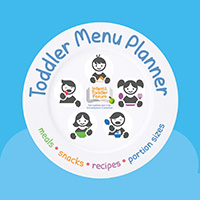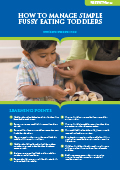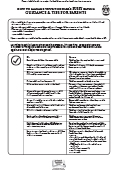
Use our Toddler Meal planning tool to ensure your 1-4 years old receives a balanced diet every day.
Find out more >
Use our toddler food tracker to check that your 1-4 year olds are getting a good balance of foods and activity
Find out more >
This educational programme for frontline professionals contains a range of practical resources on infant feeding.
Find out more >
Guidance & Tips for Parents
- If your toddler is a faddy, or fussy, eater you may be aware of how easily mealtimes can turn into a nightmare of refused food, tantrums and frustration.
- Fortunately most toddlers grow out of the problem and eventually learn to eat a variety of foods.
- There are medical reasons why your toddler might not eat. The most common ones are:
– your toddler is constipated
– your toddler is anaemic

Things to avoid
- Don’t rush a meal.
Reason: Some toddlers eat slowly and rushing a toddler to eat can reduce their appetite. - Don’t insist your toddler finishes everything on his/her plate or pressure a toddler to eat more when he/she has indicated to you they have had enough or pressure a toddler to eat more when he/she has indicated to you they have had enough.
Reason: Toddlers should be allowed to eat to their appetite and parents and carers should respect this. - Don’t take away a refused meal and offer a completely different one in its place.
Reason: A toddler will soon take advantage if you do this. In the long run it is better to offer family meals and accept that your child will prefer some foods to others. Always try to offer one food at each meal that you know they will eat. - Don’t offer the sweet course as a reward.
Reason: You will make the sweet course seem more desirable. - Don’t offer large drinks of milk, squash or fruit juice within an hour of the meal.
Reason: Large drinks will reduce your toddler’s appetite. Give water instead. - Don’t offer snacks just before a meal.
Reason: The snacks will stop them feeling hungry. - Don’t give a snack very soon after a meal if they haven’t eaten well at the meal.
Reason: Many parents may do this just to ensure their toddler has eaten something. However it is best to have a set meal pattern and wait until the next snack or meal before offering
food again. - Don’t assume that because they have refused a food they will never eat it again.
Reason: Tastes change with time. Some toddlers need to be offered a new food more than ten times before they feel confident to try it. - Don’t feel guilty if one meal turns into a disaster.
Reason: Put it behind you and approach the next meal positively. Parents also learn by making mistakes.

Things that help
- Eat with your child as often as possible.
Reason: Toddlers learn by copying their parents and other children. - Develop a daily routine of three meals and two to three snacks around your toddler’s sleeping pattern.
Reason: Toddlers don’t eat well if they become over hungry or very tired. - Offer two courses at meals: one savoury course followed by a sweet course.
Reason: This gives two opportunities for the toddler to take in the calories and nutrients needed and offers a wider variety of foods. It also makes the meal more interesting. - Praise toddlers when they eat well.
Reason: Toddlers respond positively to praise - Make positive comments about the food.
Reason: Parents and carers are strong role models. If you make positive comments about foods, toddlers will be more willing to try them. - Arrange for toddlers to eat with other toddlers as often as possible.
Reason: Some toddlers eat better when they are with their own age group. - Give small portions. If these are finished, praise the toddler and offer more.
Reason: Toddlers can be overwhelmed by large portions and lose their appetite. - Offer finger foods as often as possible.
Reason: Toddlers enjoy having the control of feeding themselves with finger foods. - Eat in a calm, relaxed environment without distractions such as TV, games and toys.
Reason: Toddlers concentrate on one thing at a time. Distractions make it more difficult to concentrate on eating. - Finish the meal within about 20-30 minutes and accept that after this the toddler is not going to eat any more.
Reason:Carrying the meal on for too long is unlikely to result in the toddler eating much more. It is better to wait for the next snack or meal and offer nutritious foods then. - Learn to recognise the signs that your child has had enough, and remove the uneaten food without comment.
Reason:Toddlers are saying they have had enough food when they:- say no
- hold food in their mouth and refuse to swallow it
- keep their mouth shut when food is offered
- spit food out repeatedly
- turn their head away from food being offered
- cry, shout or scream
- push away a spoon, bowl or plate containing food
- gag or retch
- Take away uneaten food without comment.
Reason: Accept that the toddler has eaten enough. - Involve toddlers in food shopping and preparing for the meal such as putting things on the table.
Reason: This will encourage your toddler to have a positive attitude to food. - Involve toddlers in simple cooking and food preparation.
Reason: Handling and touching new foods without pressure to eat them will help your toddler become familiar with new foods and more likely to try them. - Change the venue of meals. For example, have a picnic outside.
Reason: This will make eating and food a fun experience for your toddler and will allow them to see others enjoying food. - Make a list of all the food your child does eat over a week and then review it.
Reason: If there are foods from all the food groups and some variety within each group then you can reassure yourself that the problem may not be as bad as you thought.
There are medical reasons why your toddler might not eat. The most common ones are if your toddler is constipated oranaemic.
If faddy eating persists and you are still worried about your child’s feeding habits, consult your health visitor or GP who will advise you on what help is available.




